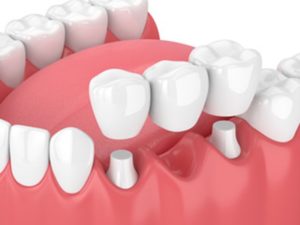
It’s estimated that roughly 170 million Americans struggle with tooth loss and are missing at least one of their pearly whites. But fortunately, solutions like dental bridges exist that are able to restore one or several missing teeth in a row! If you’re missing teeth, you might be curious about getting a dental bridge but have questions about their lifespan and required maintenance. Keep reading to learn more about dental bridges, how long they can last, and some things you can do to ensure their longevity.
What Are Dental Bridges?
Dental bridges are prosthetic devices designed to replace missing teeth, and there are two different types: removable bridges and fixed bridges. Removable bridges are often cheaper and don’t require surgery, while fixed bridges are either cemented in place or surgically fastened to your jawbone. However, both types of bridges function similarly in that they replace missing teeth and address all of the problems associated with gaps in your smile, including the tendency for additional teeth to become displaced.
How Long Can a Dental Bridge Last?
According to the University of Rochester Medical Center, dental bridges can last for anywhere from 5 to 7 years, and even 10 years in some cases. Their lifespan depends on several factors including things like your oral care routine and regular dental visits, diet, and lifestyle habits. However, oral hygiene seems to be the largest factor; the healthier and cleaner the mouth is, the longer the bridge will last.
Tips for Ensuring That Your Dental Bridge Lasts
Since the lifespan of your dental bridge relies mostly on your oral hygiene and lifestyle habits, there are fortunately many things you can do to extend its longevity. Consider the following to help your dental bridge last:
- Practice regular oral hygiene by brushing twice a day with a soft-bristled toothbrush.
- Don’t neglect flossing; it’s just as important as brushing!
- Limit your consumption of sugary foods and drinks; the high sugar content in these items can cause tooth decay.
- Be mindful of foods that are difficult to bite and chew including steak, nuts, caramel, and more.
- Visit your dentist for biannual checkups and cleanings—this also lets your dentist inspect your bridge to ensure it isn’t compromised.
- Avoid unhealthy oral habits like smoking, using tobacco products, chewing on ice, or using your teeth as tools.
The integrity of your dental bridge is closely tied to the health of your natural teeth; practicing good oral hygiene is the best way to ensure that your bridge and remaining teeth are as healthy as possible moving forward. If you’re missing teeth and think a dental bridge might be a viable option for replacing them, don’t hesitate to speak with your dentist.
About the Author
Dr. Aliana Henkin has proudly served patients and families in the Springfield, NJ area for several years. Dr. Henkin received her dental doctorate from the Rutgers School of Dental Medicine and has completed countless hours of continuing education in a wide range of fields. She is a member of the American Dental Association, the New Jersey Dental Association, and is a Fellow of the International Implant Association. If you have any questions about dental bridges or would like to schedule an appointment, you can contact Dr. Henkin through her practice’s website or over the phone: (973) 949-0925.
